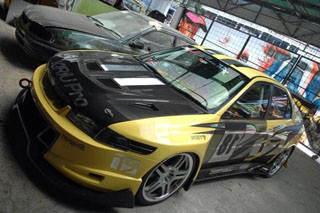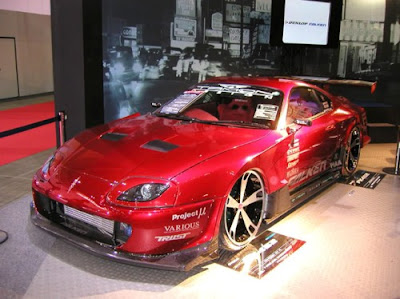 Developed by engineers that helped deliver the iconic McLaren F1, the Caparo T1 promises to get you as close to an F1 race car while remaining totally street-legal. Weighing in at 550kg or 1.212 lbs the T1 is equipped with a home-grown 3.5-litre Caparo V8 engine, which produces 575bhp (425kW) at 10,500rpm and 420Nm (310lbft) at 9,000rpm. Make the math and you’ll get the first series production car ever to break through the 1,000bhp-per-tonne barrier. To be exact, the T1 boasts a headline figure of 1,045bhp-per-tonne power-to-weight ratio! And how about performance? Well, the British supecar feautures a 0-60mph (96km/h) time of less than 2.5 seconds and the ability to reach 100mph within five seconds. Braking performance is no less impressive with 100mph to standstill being delivered in 3.5 sec.
Developed by engineers that helped deliver the iconic McLaren F1, the Caparo T1 promises to get you as close to an F1 race car while remaining totally street-legal. Weighing in at 550kg or 1.212 lbs the T1 is equipped with a home-grown 3.5-litre Caparo V8 engine, which produces 575bhp (425kW) at 10,500rpm and 420Nm (310lbft) at 9,000rpm. Make the math and you’ll get the first series production car ever to break through the 1,000bhp-per-tonne barrier. To be exact, the T1 boasts a headline figure of 1,045bhp-per-tonne power-to-weight ratio! And how about performance? Well, the British supecar feautures a 0-60mph (96km/h) time of less than 2.5 seconds and the ability to reach 100mph within five seconds. Braking performance is no less impressive with 100mph to standstill being delivered in 3.5 sec. And at what price? According to Caparo, as soon the hand-built supercar passes the final tests and goes into production, the T1 will feature a base price of £190,000 (excluding taxes) which comes to about €280.000 or $376.000. Now that’s an impressive figure. -Full press release along with specs and photos after the jump
Caparo T1 breaks cover during final stages of test and development
Caparo Vehicle Technologies – a new and advanced automotive engineering consultancy formed a year ago by the rapidly expanding Caparo Group to provide carmakers globally with a centre of excellence in lightweight vehicle design – is putting the finishing touches to the first car it has ever produced.
The Caparo T1 is a high performance two-seater sports car with highly resolved aerodynamics, which has been designed with the looks and performance close to that of a Formula One race car. With series production about to commence, the car will be built for discerning customers seeking the ultimate track day experience in a road driveable vehicle. The Caparo T1 also serves as a technology flagship for demonstrating the company’s high level vehicle design and engineering capabilities.
“We said a year ago, at the outset of this programme, that the only way to truly convince carmakers that we have the experience and skills to design a safe, reliable, cost-efficient and high-performance car is to actually design and build one,” says Ben Scott-Geddes, the car’s co-designer and operations director at Caparo Vehicle Technologies. “We’ve now done so … we’re proud of what we’ve achieved … and we now have something real and tangible to discuss.”
Releasing full details of the car’s specification during the final stages of prototype testing and development, the company has revealed that while customer cars are being readied for start of production, preparations are also well in hand for the T1’s first public appearance as a running car and star attraction at the Goodwood Festival of Speed on 22-24 June 2007 – which effectively becomes the vehicle’s launch date.
With distributors appointed in the
The biggest attraction for customers and the most striking aspect of the car’s specification is its headline figure of 1,045bhp-per-tonne power-to-weight ratio. The Caparo T1 is the first series production car ever to break through the 1,000bhp-per-tonne barrier. This has been achieved by installing a home-grown 3.5-litre Caparo V8 engine, which produces 575bhp (425kW) at 10,500rpm and 420Nm (310lbft) at 9,000rpm, into an extremely lightweight body and chassis constructed of advanced composite materials and weighing just 550kg.
The Caparo T1 is around one-third the mass of the average family saloon. Its carbon/aluminium honeycomb monocoque features a separate composite crash structure at the front, while the rear sub-frame specifies aerospace grade steel. The non carbon-fibre steel suspension illustrates the company’s ability to specify structural materials that can deliver the maximum performance at the lowest possible cost.
This means the Caparo T1 is lighter and faster even than a race-winning
This supreme power-to-weight ratio results in a 0-60mph time of less than 2.5 seconds and the ability to reach 100mph within five seconds. Braking performance is no less impressive with 100mph to standstill being delivered in 3.5 seconds.
“We’re absolutely delighted with the progress we’ve made throughout the test and development programme,” says engineering director and T1 co-designer Graham Halstead. “The aerodynamic efficiency was already well established through wind tunnel testing of a scale model even before we built the first prototype. With tens of thousands of miles of durability trials and specific testing now under our belts we have progressively fine tuned the specification of the vehicle to meet and exceed even our high performance objectives.”
“The combination of highly resolved aerodynamics and chassis make the vehicle predictably safe and responsive to driver inputs,” adds Scott-Geddes. “The car drives and handles extremely well both on the road and track and this was the number one consideration in such an uncompromised high performance vehicle.”
“The Caparo T1 not only looks and performs like a Formula One car but it also helps us to demonstrate new and advanced technology to vehicle manufacturers in the aerospace, automotive, defence, marine and motorsport industries,” says Richard Butler director Caparo Vehicle Technologies and chief executive of Caparo Vehicle Products. “Already, we’re working on a number of highly confidential client projects, applying the same approach to aerodynamics, choice of materials and efficient vehicle design, which has allowed us to develop the T1.”
“Ultimately, our goal is to help carmakers to create a new generation of more fuel-efficient and lightweight family cars with significantly lower CO 2 emissions more in keeping with the needs of the 21 st century,” says Angad Paul chief executive of the $1.2bn turnover Caparo Group, a fast-growing automotive Tier 1 supplier, which created Caparo Vehicle Technologies to back the T1 project. “We will help carmakers achieve their objectives by continuing to invest in advanced technology in order to develop new lightweight materials and commercialise their manufacturing processes so they are affordable for mass production.”
“Given the car’s performance potential - the engine has already been successfully bench tested to 700bhp on methanol - we are now looking into the possibility of introducing for our customers an international T1 race series,” says commercial director Sean Butcher. “Our objective is to give customers an affordable and reliable season on the track without incurring the extraordinary costs of running a real Formula One car.”
“Customers comprise private individuals with a passion and desire for ultra high performance and corporate clients requiring an affordable yet prestigious track car for the fast growing market of hospitality race experience events,” added Butcher.
In terms of colour and trim each of these highly exclusive hand-built cars, which has a starting price of £190,000 (excluding taxes), will be tailored to suit individual customer requirements.
Caparo V8 engine specification:
- Bespoke 3.5 litre normally-aspirated fuel-injected V8
- 575bhp (425kW) at 10,500rpm
- 420Nm (310lbft) at 9,000rpm
- Original concept tested at up to 700bhp (515kW) on methanol
- Limited to 10,500rpm for reliability but designed for maximum 12,000rpm
- 90 degree V8, 4 valves per cylinder, 4 overhead camshafts
- 93mm bore / 64.3mm stroke
- Finger follower valve train system
- Lightweight titanium valves
- Aluminium head
- Aluminium block
- Steel billet ‘flat plane’ crankshaft
- Internal piston cooling system
- Aluminium / Nikasil liners
- Gas filled ring cylinder head sealing system
- Dry sump with one-piece sump / ladder frame for increased stiffness
- 8 butterfly throttle system
- Electronic sequential fuel injection system with twin-spray fuel injectors
- Engine concept is essentially to Indy racecar specification but with revs dropped to 10,500rpm for extended reliability in Caparo T1
- Pectel SQ6 engine control unit (ECU)
- Engine is fully stressed but installed in T1 to take torsion loads only
- Longitudinal, lateral and vertical loads taken up by tension and compression links to the rear of the chassis
- Engine runs on 98RON pump fuel at a fuel pressure of 5bar
- Fuel system is a return top tank system to eliminate fuel vapourisation
- Engine bottom end modified from race engine specification to increase main bearing tolerances and help cold start of the engine
- A bespoke carbon air-box and filter tray has been designed and installed to suit the Caparo T1
- Air filter is a mesh and washable filter system
- All up engine weight with ancillaries is circa 116kg
Caparo T1 vehicle specification
Overall description
- Advanced technology composites for ultra lightweight construction
- 575bhp V8 engine / 550kg kerb weight
- 1,045bhp-per-tonne power-to-weight ratio for ultra high performance
- Fully tuneable aerodynamics
- 2-seater
- Rear mid-engine layout
- Built for discerning customers but also technology flagship for Caparo Vehicle Technologies - demonstrating principles of lightweight vehicle design which can also be applied to everyday cars
Aerodynamics
- Front cockpit road aero screen, other options available for track use
- Ground effect diffuser
- Adjustable front twin element wing
- Adjustable rear single element wing
- Adjustable fowler flaps
- Low drag body design
- Range of wing options for road and track
Steering
- Magnesium cased lightweight high ratio steering rack
- Bespoke removable steering wheel
Capacities
- Dry sump tank 8 litres
- Fuel tank 70 litres
Body
- Carbon fibre multi part body with tuneable aerodynamics
- Designed in sections for easy repair
- Carbon/glass and Nomex panel construction
Chassis
- 2-seater carbon/aluminium honeycomb monocoque
- Separate front composite crash structure
- Rear tubular aerospace grade steel space-frame
Suspension
- Streamline double wishbone front and rear
- Tuneable front and rear anti-roll bar
- Five-way adjustable race dampers
Safety
- Central safety cell with high strength steel roll hoop
- Composite front crash structure
- Head protection system
- 6-point harness for driver and passenger compatible with HANS (head and neck restraint system) device
- Fire system
Electronics
- Fully tuneable engine ECU
- Bespoke wiring aerospace grade loom
- Multi-function race dash including data logging
- Speed sensors for traction and launch control
- Fly-by-wire throttle for optimum tuning
Gearbox
- Bespoke magnesium pneumatic paddle-shift gear change
- Paddle-shift gear change control
- Limited slip differential
- Equal length hollow tripode driveshafts
- Various gear and final drive ratios available
Brakes
- 355mm diameter steel race discs front and rear
- Fully floating discs
- Front 6 pot billet machined race callipers
- Rear 4 pot billet machined race callipers
- Fully adjustable brake bias pedal box
- Pad compound options available
Equipment
- Road legal SVA approved road version and full track versions available
- Road and track parts fully interchangeable
- Wet weather canopy/bib screen or race screen
- Further bespoke options to individual customer requirements
Weight
- 550kg (dry weight)




















